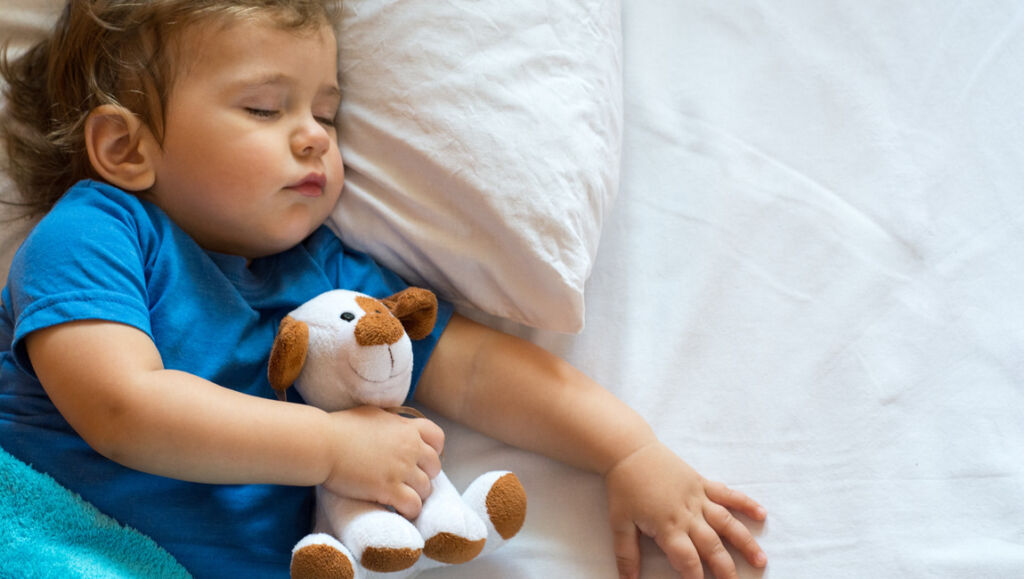As adults, sleep is one of the greatest things imaginable. But as kids, sleep is just the worst. There are so many other fun and interesting things that your little ones could be doing instead of catching their Zs. As parents, it’s fundamentally important that you get your child on a healthy sleep routine from the get-go. Research shows that kids who sleep a proper amount of time each night do better on cognitive tests in school and have a lower risk of heart disease, obesity and diabetes in the future. Sleep gives your child the energy he needs to conquer his tiny little world. Here’s what you can do to foster a healthy sleep schedule for your family.
Sound Sleep, Big Benefits
Many years ago, scientists believed that the body just simply shut-off during sleep but modern research shows that the brain is actually quite active during this time. While their sleeping, a child’s body is busy rebuilding cells, improving memory and restoring energy that was lost during the day. In your tiny one, sleep is also an imperative time for the brain to grow. This crucial time allows them to process new information that they’ve learned over the course of the day. Not getting enough sleep can lead to crankiness, irritability, reduced retention at school and a lower ability to function well throughout the day. Chronic sleep loss can lead to depression, heart disease, stroke, obesity and diabetes.

The Timeline of Sleep
Every stage of life has different sleep requirements and starting young can make a big difference in your child’s daily life. Newborns will need to sleep between 15 and 16 hours each day. Infants, age 1-12 months, need 14-15 hours of sleep each day. As your child grows and changes out of the baby stage and into the more active toddler and young child stage, their sleep needs will also change. Children, age 1-6, require 12-14 hours of sleep. When a child is between the ages of 7 and 12, they need 10-11 hours of sleep each night and 12-18 year olds need roughly 8 to 9 hours a night, though current research is looking into the need for more sleep during the teenage years.
How To Set Your Sleep Clock
Inside of all of us is a biological clock that controls the daily rhythms of our body. The circadian rhythms are controlled over a 24-hour cycle and help your child to know when to wake up and when to go to bed. As the day winds down, their body knows to release melanin to help them doze off to sleep. When the melanin wears off, they’ll bounce awake, refreshed and ready to play. The best thing you can do for their tiny bodies is to help their biological clock know exactly when to release this melanin. The best way to make this happen is to get them on a normal and predictable sleep cycle.
Foster Good Sleep Hygiene
It’s important to set your child up for a lifetime of great sleep, something researchers call sleep hygiene. To make sure their minds and bodies are functioning at the best level possible, you can add several techniques to their daily routine to make sure you are setting their biological clocks and providing them with the correct amount of sleep each night.
- Calm Down Time. Having a turn-off time can help your child prepare for sleep. Take an hour before they will get ready for bed and turn off all electronic devices and do a quiet activity, like reading a book or coloring a picture.
- Take a Warm Bath. Give your child a nice bath before bed to help them relax and begin to get sleepy.
- Eliminate Caffeine. Your children should avoid caffeine throughout the day and especially before bed. Caffeine works as a stimulant which can keep your children up later and affect their sleep quality.
- Rethink Naps. Taking a nap is an important part of your baby’s daily life and is vital to their growth and development. But as your child approaches Kindergarten, they may begin to wean off of their previous naptime. This is normal and can actually help them sleep better throughout the night. If a child is still taking a nap but having a hard time falling asleep at night or rising too early in the day, it may be time to rethink the rest time once they reach the appropriate age.
- Sleep Like a Bat. Your child’s room should be a dark, cool place that resembles a cave. Having lights or electronic devices can affect your child’s sleep quality and have adverse effects as they grow.
- Be Predictable. Make sure to go to bed at the same time and wake up at the same time each day. Having a set bedtime can help your child’s body know when to provide the essential sleep functions.
Be an Example
Your children look to you as their sounding board and example for all of the things that they will accomplish in life. To make sure they set good sleep habits early, you’ll want to make sure that you are also modeling good sleep behavior. Besides, if you’re run-down, it will be harder to provide the attention and energy needed to keep up with bouncing kiddos.Sleep is one of the basic and essential functions that children need to grow. In fact, without it, no one would be able to thrive. Research shows that children who get enough sleep have a better chance at proper growth and development, and have less injuries and greater attention spans. That’s definitely reason enough to start creating healthy sleep habits now that will last a lifetime.



